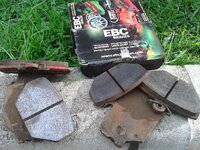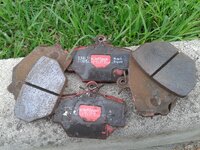I've had Redstuff, Yellowstuff, Bluestuff NDX on various cars over the last 10 years and haven't had a single failure - and that included plenty of track days, fast road driving and 'Ring trips. Used them on both my e34 M5s (Red then Yellow) and my Z4MC (Yellows & Blues).
I also only ever buy directly from EBC (http://ebcbrakes.com/) or from one of their reputable re-sellers as it has been known for fakes to be supplied from unofficial suppliers.
But to balance this out, I've also bought a set of Greenstuff for my mate that separated after about a year/10,000 miles - EBC replaced them without question, just asked for the old pads back to see if they could trace the fault to a specific batch.
I've also had Ferodo & Pagid road/track pads crumble/separate, so bad batches are not limited to one manufacturer.
I also only ever buy directly from EBC (http://ebcbrakes.com/) or from one of their reputable re-sellers as it has been known for fakes to be supplied from unofficial suppliers.
But to balance this out, I've also bought a set of Greenstuff for my mate that separated after about a year/10,000 miles - EBC replaced them without question, just asked for the old pads back to see if they could trace the fault to a specific batch.
I've also had Ferodo & Pagid road/track pads crumble/separate, so bad batches are not limited to one manufacturer.

